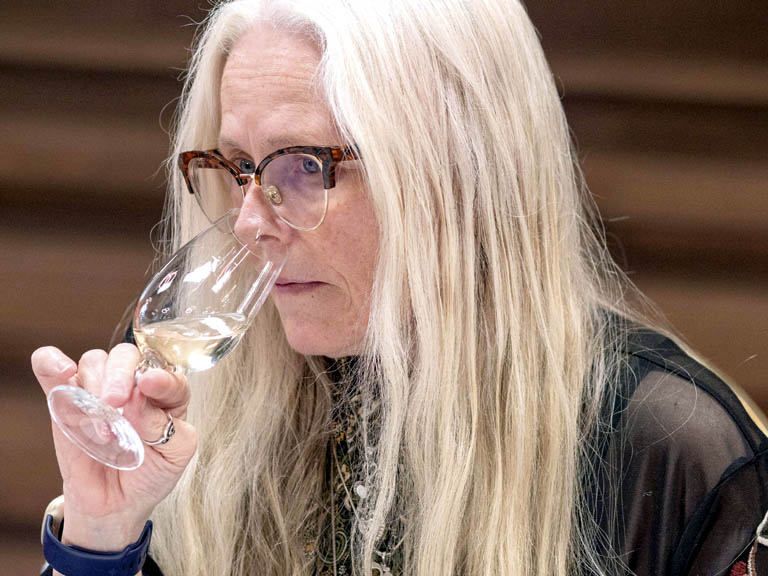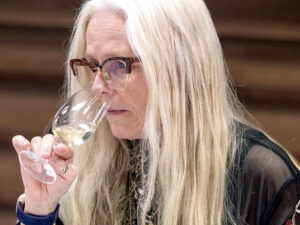County News
All Canadian Wine Championships

County wines compete with the best Canada has to offer
Once again this year, County wines made a good showing at the All Canadian Wine Championships, which wrapped up at the CAPE last week. This is Canada’s longest running wine competition. It was started by Brian Bannon in Windsor in 1981 and ran annually there until 2013 when the competition moved to the County with organizer Bev Carnahan, who had assumed the lead role in 2003. The first competition had 25 entries, mostly from Ontario. This year’s competition saw 173 wineries, cideries and meaderies participating, with 995 entries. For two days last week, a team of 15 sommeliers smelled, tasted and judged each of the wines, ciders or meads and awarded medals and trophies to the best of the best. The entries are divided into 55 categories and are judged on a 100- point scale. The top wines, ciders or meads in each category are awarded a “gold” certification, with lower scores receiving silver or bronze. The gold award drinks are judged against each other in the same category and the winner is awarded a “double gold”. There is also a Trophy round which picks the best of the best in each of eight categories: sparkling, red, white, rosé, dessert wine, fruit wine, cider and mead. Twenty-three County wines were awarded medals, with wines from The Grange and Potter Settlement winning double gold.
MJ Macdonald, who operates Decanter in Wellington with her partner, Angie, was one of the judges for the competition. She was trained as a sommelier by the International Sommelier Guild in 2012. “I’ve always been a big fan of wine. I’m a collector of wine and I became a wine agent in 2011 with my partner and we focused on local Ontario wines. We’ve travelled the world to learn about wine and we have a big passion about wine,” she said. When judging a wine, Ms. Macdonald looks at whether the wine is true to its varietal, and whether it’s clean and unfaulted. It’s a blind tasting procedure. The wine bottles are wrapped in brown paper and brought to the tasting table.

Merrill House Wine Director Astrid Young checks the bouquet of a chardonnay during the All Canadian Wine Championships.
Typically six wines are tasted in a flight and compared against each other, and there could be dozens of wines in the same category. Each judge smells the wine in the glass and then tastes it, swishing the wine around in their mouth to engage all of the taste buds. After that, they spit out the wine and move to the next one. All that tasting takes a toll on the palate. “We take breaks, we drink water, and we have raw carrots on the table that can take some of the tannins off your teeth. We also have plain bread at the table that can help refresh your palate. After a couple of days you feel it in your gums and your teeth are stained,” said Ms. Macdonald. “We don’t swallow the wine. This is a more technical exercise to evaluate the wines fairly. I’d never make it through the day if I was drinking 34 chardonnays before 11 in the morning.” She said there is a wide range of flavour profiles from the same type of wine made at wineries across the country. East coast grapes are grown in cooler conditions with a shorter growing season, whereas west coast wines may have a longer time to ripen and develop sugars. Weather and climate also make a difference from year to year. “Sometimes it’s not about the quality over time, but about ‘What did Mother Nature bring?’. We’ve also seen the effect of forest fires with a bit of smoke taint on some wines,” she said.
Ms. Carnahan said that there has been an explosion in the numbers of rosés over the past few years, enough so that a new category had to be established for them. Quebec is also producing some ciders and fruit wines. “The quality of the fruit is outstanding, and the mead is very creative in what they infuse them with,” she said. The majority of the drinks in the competition are red and white wines. These are split into three segments: whether barrel-aged or not, and by price point. Each winery sends three bottles of every wine they enter. One bottle is used for the initial judging, with a second bottle as back-up. The third bottle is used if the beverage makes it to the trophy round. Unopened bottles left over from the competition are donated to the Rotary Club of Picton, who will hold a fundraising auction later in the year. This will give wine lovers a chance to taste a wine from another province that they may not otherwise have access to. A list of the medal winning wines can be found at allcanadianwinechampionships.com

Comments (0)